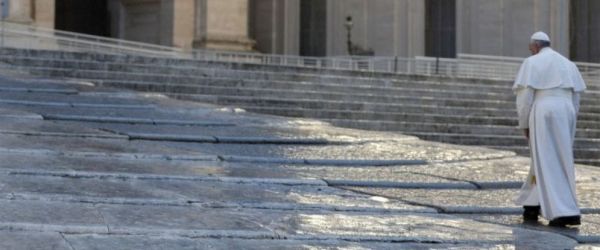Pope Francis [...] returned to one of his mother ideas: the importance for the Christian, and not only, of reading a few lines of the Gospel every day. For a believer the gospel is not a book like any other but, since Jesus is the Incarnate Word of the Father, the collection of his words makes possible a particular efficacy of the action of the Holy Spirit within each one of us.
In reality, however, we often forget this and this happens because we do not know how to combine the words spoken two thousand years ago with our daily lives. The secret to making the gospel a daily presence is to discover that it is already in itself "a daily presence".
The Sunday on which the Pope asked us to return to giving importance to the Gospel was, for example, the Sunday on which the first half of the football championship ended: that is, the first half of a championship that is the first (and hopefully the last) without a public.
There were a lot of goals and surprising results and, according to the experts, this was largely due to the absence of a public: there are players, especially the younger ones,' said Fabio Capello, for example, 'who score more goals without a public, they perform better, because they have more courage.
It is, in a macroscopic way, the problem we all have: giving enormous importance to the judgement of others on us. We all feel the urge to be in the group because being in the group, in the social organisation, makes us feel protected, 'on the right side', we are not alone in facing life. But it is precisely this atmosphere of security that is often the chain that keeps us in prison, that prevents us from being ourselves and that drives us to betray our aspirations.
Each one of us, here is the lesson that comes to us from a championship such as this, has 'an audience' to which we are more or less consciously accountable: and the gospel could help us precisely to rid ourselves of this to a good extent. Jesus Christ, whether we believe he was God or not, was certainly a person who went against the expectations of his 'audience': whether they were the relatives, friends or the powerful of his time.
In a discussion, Christ tells the Pharisees that it is impossible for them to follow him, not because they do not know in their hearts that he is right, but because, by following him, they would have lost the consensus of their group. "How can you believe, you who take glory from one another, and do not seek the glory that comes from God alone?" (John 5:44).
We understand for ourselves that reading a sentence like this in the morning before going to the office or entering into an important relational dynamic would be infinitely liberating: and this regardless of whether one is a believer or a practitioner. That is why Bergoglio's words on the gospel have universal value.
[https://www.agi.it/blog-italia/idee/post/2021-01-28/campionato-senza-pubblico-papa-francesco-vangelo-11184640/]












